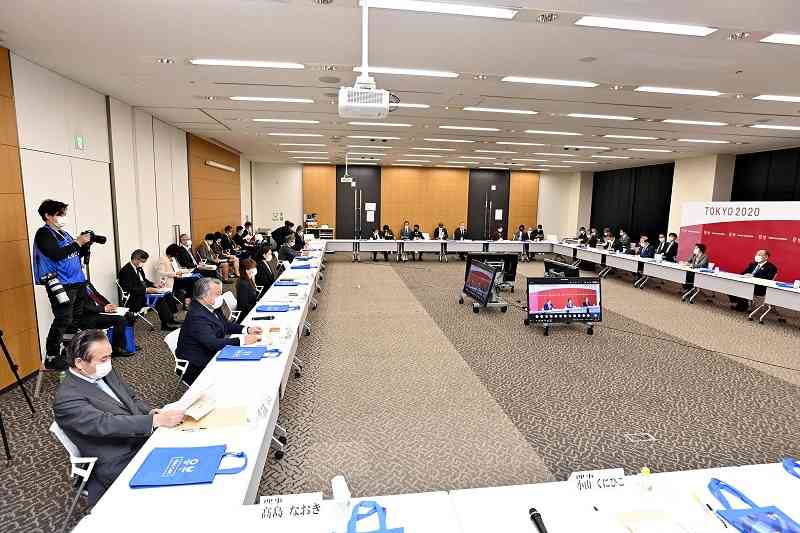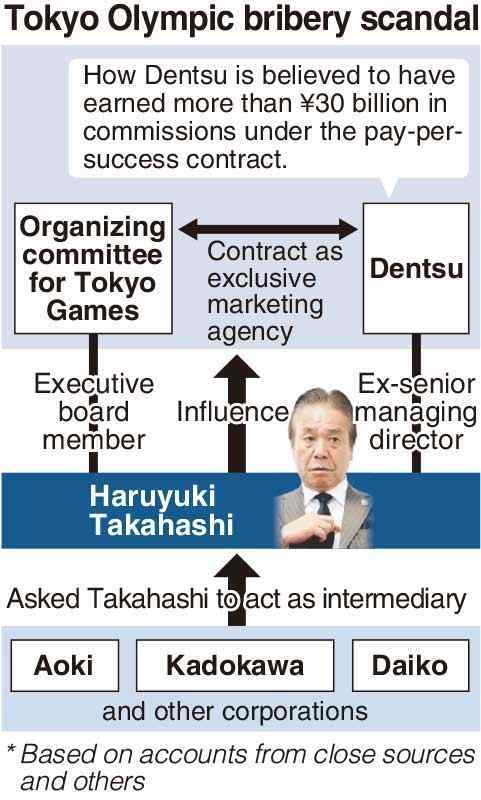Olympic scandal / Takahashi’s expansive power in sponsor selection process proved lucrative for Dentsu

Haruyuki Takahashi, far left, attends a meeting of the executive board of the Tokyo 2020 organizing committee in Tokyo on March 2, 2021.
The Yomiuri Shimbun
6:00 JST, October 27, 2022
This is the second installment of a series on corruption behind the 2020 Tokyo Olympics and Paralympics.
***
As more details emerge regarding the backroom dealings to select corporate sponsors for the Tokyo Olympics and Paralympics, it becomes increasingly clear the inordinate power wielded by Haruyuki Takahashi, the former executive board member of the organizing committee at the heart of the scandal.
The organizing committee was established in January 2014. Thirty-four members mainly from the political, business and sports worlds were short-listed to serve on the executive board, which would make final decisions on important contracts such as the building and maintenance of competition venues.
Under the by-laws of the organizing committee at its launch, the maximum number of executive board members was set at 35. Former Prime Minister Yoshiro Mori, 85, who had been appointed as president of the organizing committee, approached Director General Toshiro Muto, 79, and other committee members about filling the final slot with Takahashi, 78, who had been a senior managing director at advertising giant Dentsu Inc.
Referred to as “the No. 1 man in the business of sports,” Takahashi had been involved in the Tokyo Games from the bidding stage.
The 34 others officially become executive board members in March 2014. And yet Takahashi’s appointment was postponed for three months. Why?
At that time, the “exclusive marketing agency” that would singlehandedly handle sponsorship recruitment for the organizing committee had not yet been chosen. Dentsu and the organizing committee were engaged in contentious negotiations over the sponsor selection process and commission fees.
“If Takahashi became an executive board member ahead of the decision [on the exclusive marketing agency], that could give an impression that the committee prioritized Dentsu as the agency from the beginning,” a senior member of the organizing committee at the time said.
It should be noted that a number of company executives looking to enter the Olympic business had already started making “Takahashi pilgrimages” in anticipation of Dentsu becoming the marketing agency, with the expectation of gaining influence with Dentsu.
One was Yoshikazu Taniguchi, 57, a current executive officer of Daiko Advertising Inc., another major advertising firm, who has been arrested on suspicion of bribery. Around the time Tokyo had won the bid to host the Games, Taniguchi allegedly had sounded out Takahashi about the possibility of Daiko also becoming involved in sponsorship recruitment.
Behind-the-scenes move
Dentsu was informally appointed as the exclusive marketing agency in March 2014, and Takahashi got his seat on the executive board in June that year.
“I put together the sponsors through ‘high-level diplomacy,’ and then Dentsu’s sales activities followed,” Takahashi told The Yomiuri Shimbun in July this year when explaining his and Dentsu’s roles.
Dentsu began campaigning for corporate sponsors in January 2015, and in just three months, met the “minimum guarantee” of ¥180 billion in sponsorship revenue for the organizing committee. A few months later, the figure exceeded the ¥200 billion threshold that bumped up Dentsu’s commission rate to 12%.
Takahashi also worked tirelessly as an intermediary for would-be sponsors. From 2017, he repeatedly met with Hironori Aoki, 84, the former chairperson of major business clothing retailer Aoki Holdings, Inc., who has now been indicted on charges of offering bribes. Takahashi also deepened ties with executives at publishing giant Kadokawa Corp.
Daiko’s Taniguchi repeatedly implored Takahashi to allow a language service firm become a sponsor with his company as a go-between.
Takahashi tried to expand his influence over the many Dentsu employees who were on loan to the organizing committee’s marketing division, which was responsible for selecting sponsors and the screening of official licensed merchandise.
At the request of the Aoki company, Takahashi had the head of the committee’s marketing division, who had come from Dentsu, meet an Aoki executive to facilitate direct negotiations between the sides.
“Although I persuaded many companies into becoming sponsors, it was Dentsu that reaped the most rewards,” Takahashi later told The Yomiuri Shimbun. “Shouldn’t Dentsu pay me some part of the commission fee?” he added with a laugh.
Within Dentsu, some reportedly tried to distance themselves from Takahashi, who was involved in selecting sponsors even though his being an executive board member also made him a quasi-public servant.
Dentsu employees on loan to the marketing division who submitted to voluntary questioning by the Tokyo District Public Prosecutors Office said they were “wary of unreasonable requests from Takahashi but could not refuse because he was also a Dentsu alumnus.”
Olympic business
Since the 1984 Los Angeles Games, when the Olympics switched to a private-sector-led operation, the principle of “one industry, one company” has prevailed when it comes to Olympic sponsors.

However, Dentsu and the organizing committee approached the International Olympic Committee about relaxing this precept for the Tokyo Games. By breaking down the goods and services offered into individual types, the range of industries could be expanded, leading to an increase in sponsorship revenue.
In the end, Dentsu put together ¥376.1 billion in sponsorships, which is believed to have brought the company more than ¥30 billion in commissions. Another senior member of the organizing committee was critical of Dentsu, saying: “Dentsu expanded the sponsorship framework to industries with little connection to the Olympics. Revenue from commissions was the top priority.”
Since August this year, Takahashi has been arrested four times by the special investigation squad of the Tokyo District Public Prosecutors Office on suspicion of accepting bribes through five channels, including Aoki. Dentsu was also searched for possible involvement.
“Takahashi’s sponsorship campaign also benefited Dentsu,” a senior prosecutor said. “With the organizing committee incapable of oversight, it must be said that a Dentsu alumnus and Dentsu tacitly sought to conspire to enrich each other.”
Most Read
Popular articles in the past 24 hours
-

Milano Cortina 2026: Japanese Gold Medalist Figure Skater Miura S...
-

Yokohama to Test Out Renewable-Powered Offshore Floating Data Cen...
-

Japan’s Takaichi Speaks on New U.S. Tariff in Upper House, Says P...
-

Takeshima Day: Persistently Demanding Resolution from South Korea...
-

Japanese Watermelon Shipments Starts in Leading Production Distri...
-

Ishinomaki Man Plush Toy Offers Hope to Children in Times of Disa...
-

Japan Authorities Begin On-site Inspection of Japanese Microsoft ...
-

Nikkei Average Rewrites All-Time Closing High
Popular articles in the past week
-

Producer Behind Pop Group XG Arrested for Cocaine Possession
-

iPS Treatments Pass Key Milestone, but Broader Applications Far f...
-

Japan, U.S. Name 3 Inaugural Investment Projects; Reached Agreeme...
-

Tokyo Skytree's Elevator Stops, Trapping 20 People; All Rescued (...
-

Japan’s Major Real Estate Firms Expanding Overseas Businesses to ...
-

Milano Cortina 2026: Japanese Gold Medalist Figure Skater Miura S...
-

Baby Monkey Punch Captures Hearts at Chiba Pref. Zoo, on Social M...
-

Milano Cortina 2026: Japanese Figure Skater Kaori Sakamoto’...
Popular articles in the past month
-

Producer Behind Pop Group XG Arrested for Cocaine Possession
-

Japan PM Takaichi’s Cabinet Resigns en Masse
-

Japan Institute to Use Domestic Commercial Optical Lattice Clock ...
-

Man Infected with Measles Reportedly Dined at Restaurant in Tokyo...
-

Israeli Ambassador to Japan Speaks about Japan’s Role in the Reco...
-

Videos Plagiarized, Reposted with False Subtitles Claiming ‘Ryuky...
-

Man Infected with Measles May Have Come in Contact with Many Peop...
-

Prudential Life Insurance Plans to Fully Compensate for Damages C...
Top Articles in Society
-

Producer Behind Pop Group XG Arrested for Cocaine Possession
-

Man Infected with Measles Reportedly Dined at Restaurant in Tokyo Station
-

Man Infected with Measles May Have Come in Contact with Many People in Tokyo, Went to Store, Restaurant Around When Symptoms Emerged
-

Woman with Measles Visited Hospital in Tokyo Multiple Times Before Being Diagnosed with Disease
-

Australian Woman Dies After Mishap on Ski Lift in Nagano Prefecture
JN ACCESS RANKING
-

Producer Behind Pop Group XG Arrested for Cocaine Possession
-

Japan PM Takaichi’s Cabinet Resigns en Masse
-

Man Infected with Measles Reportedly Dined at Restaurant in Tokyo Station
-

Israeli Ambassador to Japan Speaks about Japan’s Role in the Reconstruction of Gaza
-

Videos Plagiarized, Reposted with False Subtitles Claiming ‘Ryukyu Belongs to China’; Anti-China False Information Also Posted in Japan









